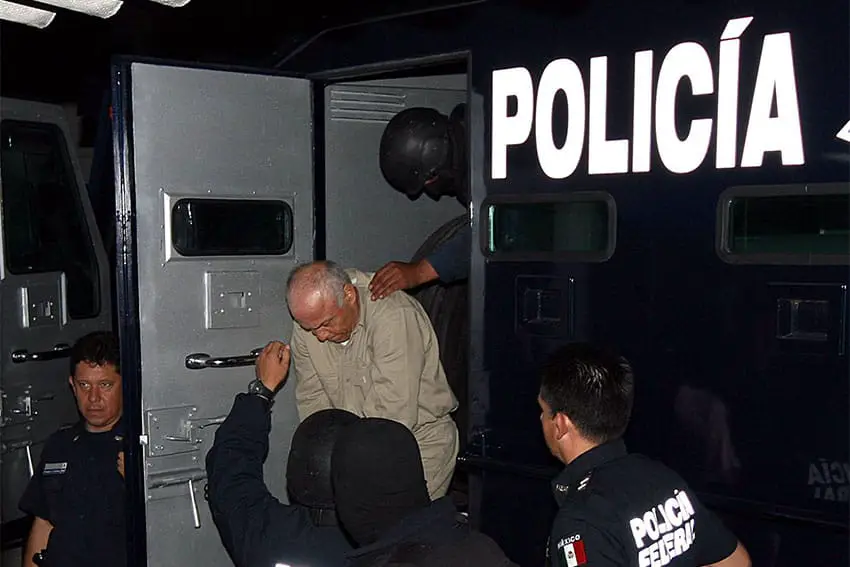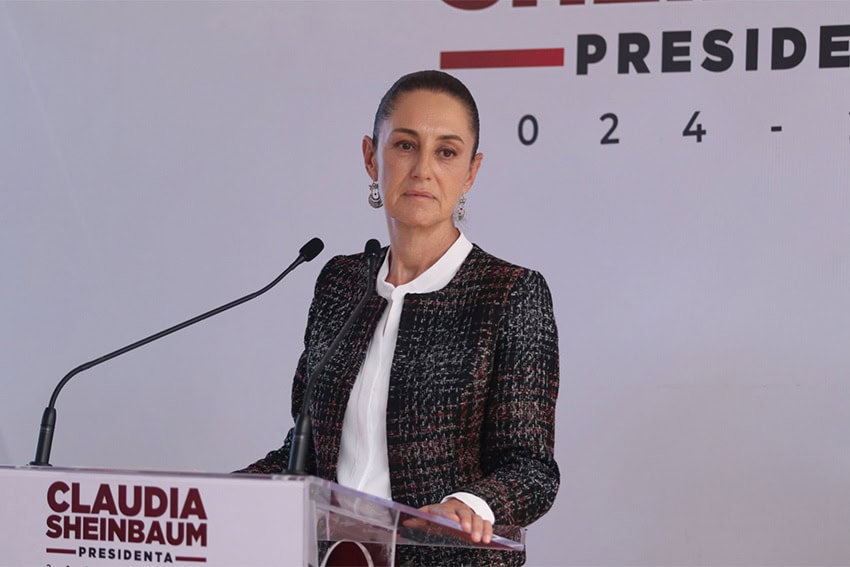Three and a half years after he was arrested in connection with the 2005 detention and torture of investigative journalist Lydia Cacho, former governor of Puebla Mario Marín was released from prison and allowed to go into house arrest pending trial.
A Cancún-based judge ruled on Saturday that the charges the 70-year-old ex-governor faces — torture and protection of a child-trafficking ring — don’t warrant his pretrial detention.

Marín, Institutional Revolutionary Party (PRI) governor of Puebla between 2005 and 2011, reportedly arrived at his home in Puebla City on Monday after his release from the “Altiplano” federal maximum security prison in México state.
He was arrested in Acapulco in February 2021, 16 years after Cacho was detained in Cancún by Puebla police on his alleged orders.
Cacho’s arrest came after she wrote a book published in 2005 called “The Demons of Eden,” in which she exposed a pedophilia ring in Cancún that she alleged was run by businessman Jean Succar Kuri. He was later convicted of the crime and sentenced to more than 100 years in jail.
Cacho also implicated Kamel Nacif Borge, a businessman known as “El rey de la mezclilla” (the denim king) for his large textile empire, and he subsequently filed a defamation complaint against her that led to her arrest.
After Cacho was detained in Cancún, police drove her more than 20 hours to Puebla, during which time they taunted and tortured her, threatened her with rape, forced a gun into her mouth and debated drowning her in the Gulf of Mexico’s Campeche Bay. She was held in custody in Puebla for two days before being released on bail.
The case became a national scandal when a tape was leaked of a conversation between Nacif and Marín in which the former is heard thanking the latter for arresting Cacho.
🆘En este momento estamos en audiencia, la Jueza Angélica del Carmen Ortuño Suárez nos ha dicho que va a liberar a #MarioMarín que no amerita prisión preventiva por su delito de tortura y protección de redes de trata infantil. @NormaPinaH #Tortura pic.twitter.com/pca5dkGZSl
— Lydia Cacho (@lydiacachosi) August 10, 2024
Cacho’s post on Twitter decrying the court decision to free Marín from pretrial detention, which Marin has been serving since his 2021 arrest in Acapulco.
In 2020, a former police official was sentenced to five years and three months in jail for his role in Cacho’s torture.
Cacho attended the court hearing in Cancún on Saturday via video link and announced on the X social media platform that Judge Angélica del Carmen Ortuño Suárez had decided to release Marín from preventive detention.
Cacho, a Mexico City native who fled Mexico in 2019 shortly after thieves broke into her home, accused the judge of “protecting the rights of torturers and violating mine” and “throwing overboard” efforts to capture the ex-governor during a period of 15 years.
“Mario Marín hasn’t been exonerated, but he is a dangerous prisoner for me, for my witnesses and my family,” she wrote on X.
“I hold the judge … responsible for anything that might happen to my legal team that was at the hearing today, or to any of us,” Cacho said.
“The judge … is imposing a fine of just 100,000 pesos (on a governor who has a chalet in Switzerland). She is releasing him right on the home stretch when we were expecting a tough sentence for torture. That is the power of the ex-governor of Puebla within the judicial power,” she added.
“… We’ve proven in international tribunals his links to networks … [involved in] the trafficking of girls. Criminal networks are pulling strings within the judicial power. This is the mafioso judicial power,” Cacho said in another post.
Araceli Andrade, a lawyer for Cacho, told reporters that Marín would be required to wear an ankle monitor and would be stripped of his passport, but she nevertheless expressed concern that the former governor could escape house arrest and go into hiding within Mexico.
“He has the money, the power and the influence to avoid justice,” she said.
Andrade said she would file an appeal against the judge’s decision this Wednesday.

“Mario Marín is now sleeping at his home, while Lydia Cacho hasn’t set foot in Mexico for years. … The sense of justice no longer makes sense,” she said Monday.
AMLO and Sheinbaum criticize decision to release Marín
At his morning press conference on Monday, President Andrés Manuel López Obrador described the decision to release the former governor as “another sabadazo.”
Sabadazo is a colloquial Mexican term used to refer to a decision made on a Saturday (sábado), perhaps in an attempt to avoid or lessen scrutiny and media coverage.
López Obrador — a frequent critic of Mexico’s judiciary — accused opposition parties and judges of “protecting” Marín, who was arrested during his presidency.
“And do you know why they protected him? Because Mr. Marín helped them with the electoral fraud in 2006,” he said, referring to his claim that his narrow loss to Felipe Calderón in the presidential election held that year was illegitimate.
President-elect Claudia Sheinbaum echoed the words of her political mentor by also calling the decision to allow the former governor to await trial at home a “sabadazo.”

The decision, she added, provides another reason to “change the judicial power.”
Sheinbaum supports a controversial judicial reform proposal López Obrador sent to Congress in February. If it is approved, citizens will be able to directly elect Supreme Court justices and other judges from candidates put forth by the president of the day.
With reports from El Financiero, Milenio, La Jornada, Proceso and El Universal
